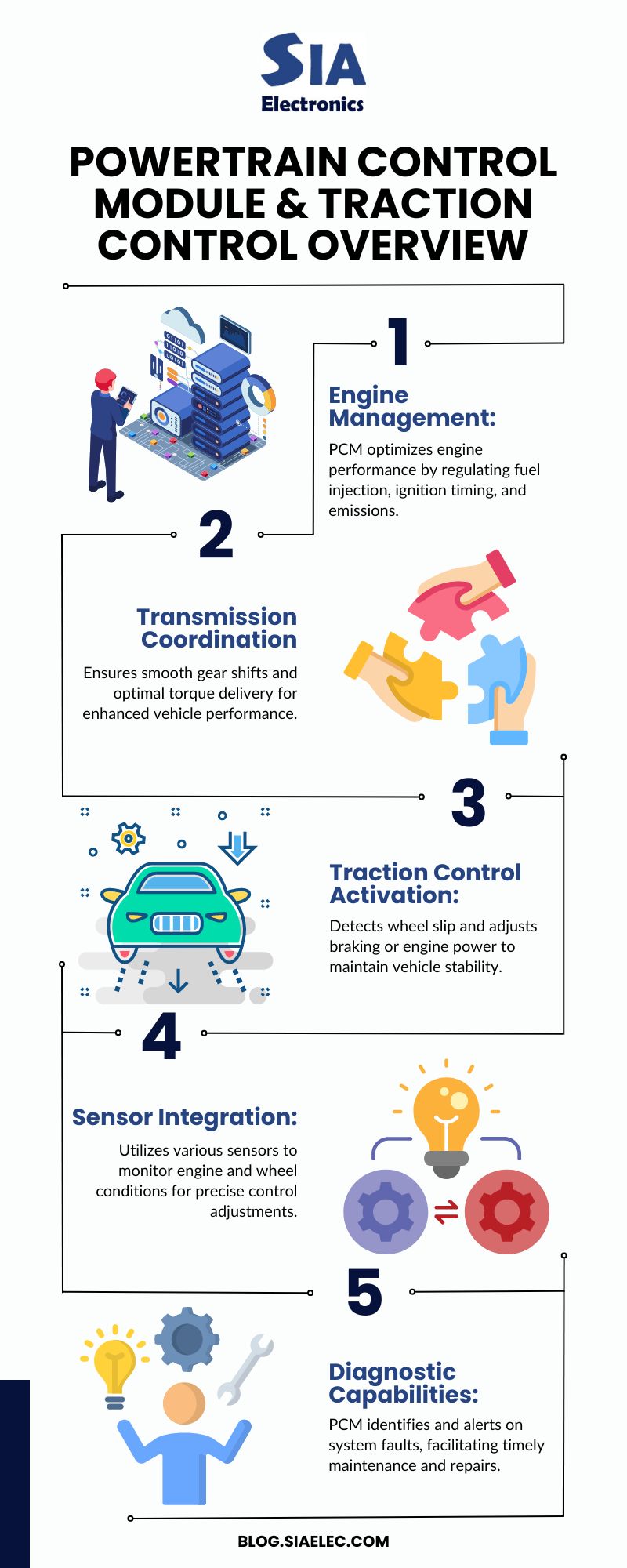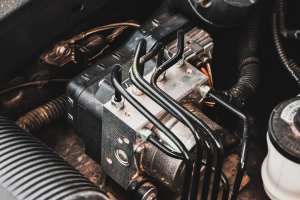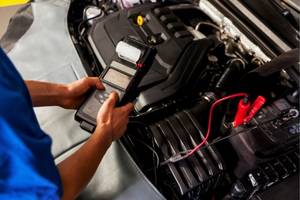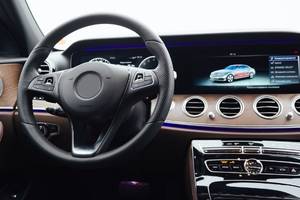Introduction
In the realm of automotive technology, the Powertrain Control Module (PCM) plays a pivotal role in managing various aspects of vehicle performance. One of its crucial functions is to influence the traction control system, which is essential for maintaining vehicle stability and safety. This blog delves into the relationship between the Powertrain Control Module and traction control, exploring common issues, diagnostic methods, and solutions.
Table of Contents
What is a Powertrain Control Module (PCM), and How Does It Affect Traction Control?
The Powertrain Control Module (PCM) is an electronic control unit responsible for overseeing the engine and transmission systems of a vehicle. It processes data from various sensors to optimize engine performance, fuel efficiency, and emissions. The PCM’s influence extends to the traction control system, which is designed to prevent wheel slippage during acceleration by modulating engine power and applying braking force.
How PCM Affects Traction Control:
- Data Processing: The PCM gathers information from wheel speed sensors and other inputs to detect wheel slippage.
- Power Management: It adjusts engine power and applies brakes to wheels that are slipping to maintain traction.
- System Integration: PCM coordinates with the anti-lock braking system (ABS) to enhance stability during adverse conditions.
Common Causes of Powertrain Control Module (PCM) Failures Impacting Traction Control
Several factors can lead to PCM malfunctions, affecting traction control performance. Identifying these causes can help in diagnosing and resolving issues effectively.
- Electrical Failures: Faulty wiring or corroded connectors can disrupt PCM operation.
- Software Issues: Outdated or corrupted PCM software can impair traction control functions.
- Sensor Failures: Malfunctioning wheel speed sensors or other inputs can lead to incorrect data processing by the PCM.
- Overheating: Excessive heat can damage the PCM, affecting its performance and reliability.
How to Reset the Powertrain Control Module (PCM) for Traction Control Issues
Resetting the PCM can often resolve minor glitches affecting the traction control system. Here’s a step-by-step guide:
- Disconnect the Battery:
- Turn off the vehicle and disconnect the negative battery terminal.
- Wait for about 10-15 minutes to ensure that all residual power is drained.
- Reconnect the Battery:
- Reattach the negative battery terminal and ensure it is securely fastened.
- Start the Vehicle:
- Turn the ignition key to the “on” position without starting the engine.
- This allows the PCM to reset its internal settings.
- Drive the Vehicle:
- Take the vehicle for a short drive to allow the PCM to recalibrate and adapt to driving conditions.
If issues persist after resetting the PCM, it may indicate a more serious problem requiring professional diagnosis.
Diagnosing Powertrain Control Module (PCM) Issues Related to Traction Control
Diagnosing PCM issues requires a systematic approach. Here are some methods to pinpoint problems related to traction control:
Diagnostic Steps:
- Use a Scan Tool: Connect an OBD-II scan tool to retrieve diagnostic trouble codes (DTCs) related to the PCM and traction control system.
- Check Sensor Data: Verify the functionality of wheel speed sensors and other related components using the scan tool or a multimeter.
- Inspect Wiring: Examine the wiring and connectors for signs of damage or corrosion that may affect PCM performance.
- Update Software: Ensure that the PCM software is up-to-date and free of glitches by checking with the manufacturer or service provider.
Causes of Traction Control System Failures Related to the Powertrain Control Module
Traction control system failures can often be traced back to issues with the PCM. Here are some potential causes:
- Faulty PCM: A malfunctioning PCM may not process sensor data correctly, leading to ineffective traction control.
- Software Glitches: Corrupt or outdated software can disrupt traction control functions.
- Sensor Malfunctions: Issues with sensors that provide input to the PCM can cause inaccurate traction control responses.
- Electrical Problems: Electrical faults in the PCM or related components can lead to system failures.
Conclusion
The Powertrain Control Module (PCM) is integral to the effective operation of a vehicle's traction control system. By understanding how the PCM influences traction control, recognizing common issues, and knowing how to reset or diagnose problems, vehicle owners and technicians can maintain optimal vehicle performance and safety.
S.I.A. Electronics stands out as a leader in the re-manufacturing of automotive electronic control modules and ECUs. With over 20 years of experience, we offer expertise in re-manufacturing mass air flow sensors, anti-lock brake computers (EBCMs), and anti-lock brake hydraulic units for both domestic and foreign vehicles.
FAQs on
Powertrain Control Module and Traction Control : Understanding the Connection
-
1. What are the signs that my Powertrain Control Module (PCM) might be failing?
Ans.
Signs of a failing PCM include erratic engine performance, unresponsive traction control, or the illumination of the check engine light. If you notice any of these symptoms, it’s essential to have your PCM inspected.
-
2. Can a faulty PCM cause my traction control light to come on?
Ans.
Yes, a faulty PCM can cause the traction control light to illuminate, as it may not properly process sensor data or control traction functions.
-
3. How often should I have my PCM checked or updated?
Ans.
It’s advisable to have your PCM checked during routine vehicle maintenance or if you experience performance issues. Software updates should be performed according to the manufacturer's recommendations.
-
4. Are there any preventive measures to avoid PCM failures?
Ans.
Regular vehicle maintenance, including checking electrical connections and keeping the PCM software updated, can help prevent PCM failures.
-
5. What should I do if resetting the PCM does not resolve my traction control issues?
Ans.
If resetting the PCM does not fix traction control issues, further diagnosis by a professional technician may be required to identify underlying problems.
-
6. How can I find a reliable service provider for PCM re-manufacturing?
Ans.
Look for a service provider with extensive experience and positive customer reviews. Companies like S.I.A. Electronics offer expertise in re-manufacturing automotive control modules and can provide reliable solutions for PCM-related issues.



